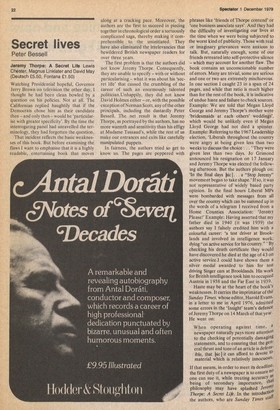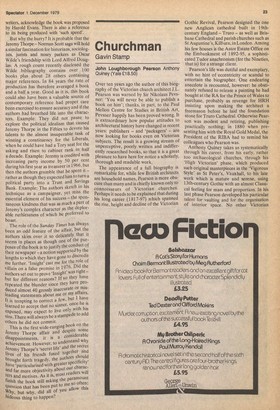Secret lives
Peter Bessell
Jeremy Thorpe: A Secret Life Lewis Chester, Magnus Linklater and David May (Deutsch £5.50, Fontana £1.50) Watching Presidential hopeful, Governor Jerry Brown on television the other day, thought he had been clean bowled by a question on his policies. Not at all. The Californian replied haughtily that if the Democrats chose him as their candidate thcn and only then would he 'particularise with greater specificity'. By the time the interrogating panel had unravelled the terminology, they had forgotten the question.
That incident reflects the basic weaknesses of this book. But before examining the flaws I want to emphasise that it is a highly readable, entertaining book that moves along at a cracking pace. Moreover, the authors are the first to succeed in piecing together in chronological order a tortuously complicated saga, thereby making it comprehensible to the uninitiated. They have also eliminated the irrelevancies that bewildered British newspaper readers for over three years.
The first problem is that the authors did not know Jeremy Thorpe, Consequently, they are unable to specify — with or without particularising — what it was about his 'secret life' that caused the crumbling of the career of such an enormously talented politician.Unhappily, they did not know David Holmes either —or, with the possible exception of Norman Scott, any of the other principals, including the dastardly Peter Bessell. The net result is that Jeremy Thorpe, as portrayed by the authors, has no more warmth and sensitivity than his effigy at Madame Tussaud's, while the rest of us make our entrances and exits like carefully manipulated puppets.
In fairness, the authors tried to get to know us. The pages are peppered with phrases like 'friends of Thorpe contend' or 'one business associate says'. And they had the difficulty of investigating our lives at the time when we were being subjected to the worst kind of publicity. Those with real or imaginary grievances were anxious to talk. But, naturally enough, some of our friends retreated into self-protective silence — which may account for another flaw. The book contains an unconscionable number of errors. Many are trivial, some are serious and one or two are extremely mischievous. In one section I caught 23 in a span of 24 pages, and while that ratio is much higher than for the rest of the book, it is indicative of undue haste and failure to check sources. Example: We are told that Megan Lloyd George and Jeremy Thorpe's mother were 'bridesmaids at each others' weddings', which would be unlikely even if Megan Lloyd George had not died a spinster. Example: Referring to the 1967 Leadership election, 'Liberals throughout the country were angry at being given less than two weeks to discuss the choice-. . . 'They were given less than two days. Jo Grimond announced his resignation on 17 January and Jeremy Thorpe was elected the following afternoon. But the authors plough on: 'In the final days [sic ] . . a "Stop Jeremy" movement began to take shape.' If so, it was not representative of widely based party opinion. In the final hours Liberal MPs were bombarded with messages from all over the country which can be summed up in the words of a telegram I received from a Home Counties Association: 'Jeremy Please!' Example: Having asserted that my father died in 1940 (it was 1939) the authors say I falsely credited him with a colourful career: 'a test driver at Brooklands and involved in intelligence work, dying "on active service for his country." 'By checking his death certificate they would have discovered he died at the age of 43 on active service.I could have shown them a silver medal awarded to him for test driving Singer cars at Brooklands. His work for British intelligence took him to occupied Austria in 1938 and the Far East in 1939.
Haste may be at the heart of the book's weaknesses. It carries the imprimatur of the Sunday Times, whose editor, Harold Evans, in a letter to me in April 1976, admitted some errors in the 'Insight' team's defence of Jeremy Thorpe on 14 March of that ye arHe went on: When operating against time, a newspaper naturally pays more attention to the checking of potentially damaging statements, and to ensuring that the gen' eral thrust and tone of an article is defens" ible, that [sic ] it can afford to devote to material which is relatively innocuous.
If that means, in order to meet its deadline, the first duty of a newspaper is to ensure no one can sue it, while treating accuracy its. being of secondary importance, t"' philosophy may have splashed Jereril, Y Thorpe: A Secret Life. In the introduction the authors, who are Sunday Times stag writers, acknowledge the book was proposed by Harold Evans. There is also a reference to its being produced with 'such speed'.
But why the hurry? It is probable that the Jeremy Thorpe —Norman Scott saga will hold a similar fascination for historians, sociolog ists, jurists and nosey parkers as Oscar Wilde's friendship with Lord Alfred Doug las. A rough count recently disclosed the Wilde bibliography contains over 100 books plus about 28 others containing major references. In 84 years the rate of production has therefore averaged a book and a half a year. Good as it is, this book could also have been a valuable source of contemporary reference had proper care been exercised to ensure accuracy and if the authors had breathed life into the charac ters. Example: They did not pause to explore the political idealism that caused Jeremy Thorpe in the Fifties to devote his talents to the almost insuperable task of winning a constituency for the Liberals, when he could have had a Tory seat for the asking and risen to cabinet rank in half a decade. Example: Jeremy is credited with increasing party income by 50 per cent during his first year as treasurer in 1966, but then the authors grumble that he spent it — rather as though they expected him to turn a political party into a Trust and Savings Bank. Example: The authors sketch in his technique as a campaigner, yet miss the essential element of his success — the spontaneous kindness that was as much a part of Jeremy's complex character as the deplorable ruthlessness of which he preferred to boast.
The role of the Sunday Times has always been an odd feature of the affair, but the authors skim over it so delicately that it seems in places as though one of the purposes of the book is to justify the conduct of their newspaper —a notion supported by the lengths to which they have gone to discredit me further. 'Insight' cast me for the role of Villain on a false premise. in 1976. Did the authors set out to prove 'Insight' was right— but for different reasons? If so they have repeated the blunder since they have produced almost 40 grossly inaccurate or misleading statements about me or my affairs. It is tempting to correct a few, but I have learned to accept that no sinner, once he is exposed, may expect to live only with his sins. There will always be a stampede to add Others he did not commit. This is the first wide-ranging book on the Jeremy Thorpe affair and despite some disappointments, it is a considerable achievement. However, to understand why Jeremy Thorpe's 'secret life' and the secret lives of his friends fused together and brought forth tragedy, the authors should have `particularised with greater specity' and far more objectivity about our characters and motives. As it is, most readers will finish the book still asking the paramount question that has been put to me so often: Why, but why, did all of you allow this hideous thing to happen?












































 Previous page
Previous page